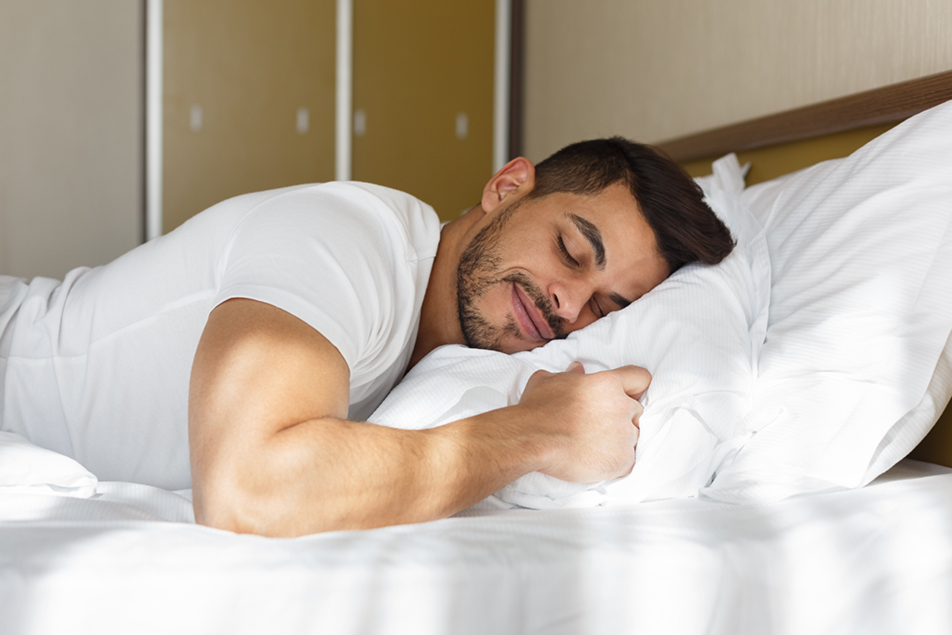
This post was written by Emily Mize, ATC, certified athletic trainer, Parkview Sports Medicine.
One of the biggest mistakes active individuals make is neglecting to prioritize rest and recovery. This doesn’t just mean taking a day off. It entails actually getting the appropriate amount of sleep needed for the body to heal and perform at its optimal level. With March being National Sleep Awareness Month, it’s the ideal opportunity to brush up on the value of hitting the hay at a decent time, cleaning up your sleep hygiene and honoring your muscles’ efforts by supporting their need to repair.
Sleep needs
The average adult needs 7-9 hours of sleep per night. [7] As you introduce new or more intense workout routines, your schedule might shift. You might be getting up earlier to make it to the gym or staying later in the evening, putting sleep on the backburner.
Over time, sleep-deprived individuals will feel the effects of the lack of rest. This could surface as something as simple as craving unhealthy foods, but it can have much larger impacts on your body’s systems. It can result in impairments to glucose sensitivity, which may hinder glycogen repletion and potentially affect appetite, food intake and protein synthesis. [6] Sleep deprivation increases pro-inflammatory cytokines, which impairs immune system function, impedes muscle recovery and repair from damage and leads to autonomic nervous system imbalance (simulating overtraining symptoms). This imbalance results in slower/less accurate cognitive performance and alters pain perception. [2,3,4]
Cleaning up your sleep hygiene
A good night’s rest starts with a good bedtime routine. Try these tips for optimizing sleep:
- Avoid blue light emitted from screens for at least 2 hours before bed (smartphones, laptop, monitors). Blue light suppresses melatonin production that is needed to induce sleep. Avoid text messaging, social media, games and app use.
- Don’t hit the snooze button. It does not improve sleep quality.
- Don’t fall asleep to the TV. Sleep studies show people who leave the television on frequently wake up during the night and have poor quality sleep.
- Check your mattress. It may need replaced (mattresses typically last a maximum of nine to ten years) and may have allergens.
- Recovery shouldn’t be about muscles exclusively. Reducing mental fatigue is just as important for healthy sleep. Reduce external stressors in your life by journaling, meditating or talking to someone you trust. [5]
Recognize the need for a rest day
When active people don’t take recovery seriously, it can lead to injury. Researchers surveyed 605 competitive athletes, and found that these were the top reasons to take a rest day [1]:
- General feelings of fatigue.
- An unexplained decrease in performance (generally lasting between one week and one month).
- Musculoskeletal aches and pains.
If these things start to pop up in your workout or daily activities, consider incorporating more rest time into your routine. This includes prioritizing sleep and mental health.
References
1. Ansorge, R. (2022, September 12). Rest and recovery are critical for an athlete's physiologicaland psychological well-being. UCHealth Today 2022. Retrieved December 21, 2022.
2. Haack M, Lee E, Cohen DA, Mullington JM. Activation of the prosta-glandin system in response to sleep loss in healthy humans: Potential mediator of increased spontaneous pain. Pain 2009; 145: 136–141
3. Haack M, Mullington JM. Sustained sleep restriction reduces emotional and physical well-being. Pain 2005; 119: 56–64
4. Haack M, Sanchez E, Mullington JM. Elevated inflammatory markers in response to prolonged sleep restriction are associated with increased pain experience in healthy volunteers. Sleep 2007; 30: 1145–1152
5. Halson S Sleep in elite athletes and nutritional interventions to enhance sleep. Sports Med 2014; 44: 13–23
6. Morselli L, Leproult R, Balbo M, Spiegel K. Role of sleep duration in the regulation of glucose metabolism and appetite. Best Pract Res Clin Endocrinol Metab 2010; 24: 687–702
7. Vitale KC, Owens R, Hopkins SR, Malhotra A. Sleep Hygiene for Optimizing Recovery in Athletes: Review and Recommendations. Int J Sports Med. 2019;40(8):535-543. doi:10.1055/a-0905-3103